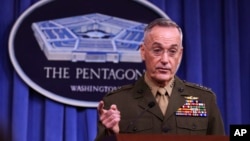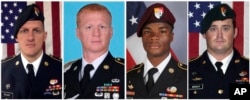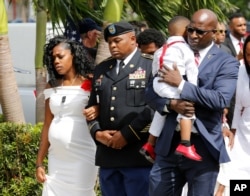The chairman of the U.S. Joint Chiefs of Staff says the families of the four U.S. soldiers killed in Niger deserve a quick and accurate investigation.
Marine General Joseph Dunford spoke to reporters Monday as the Trump administration strives to clear up the still murky details of just what happened on during the October 3rd operation.
Dunford acknowledged that many questions are still unanswered and even the Pentagon does not know exactly what happened and why. He said the probe is also geared toward learning lessons.
The general said the initial assessment is that the U.S. forces were ambushed by local tribal fighters associated with Islamic State.
One question still to be answered is why it took an hour for U.S. forces to call for backup after they first encountered the enemy and why it took another hour for French fighters jets to show up.
"I make no judgement as to how long it took them to ask for support. I don't know that they thought they needed support prior to that time, I don't know how this attack unfolded. I don't know what their initial assessment was of what they were confronted with," the general said.
Dunford also said under the rules of engagement in Niger, U.S. forces only accompany Niger forces when the "chances of enemy, contact are unlikely."
Other questions that need a thorough investigation include whether the U.S. had adequate intelligence and an accurate assessment of the threat in the area -- and why did it take two days to recover the body of Sergeant La David Johnson.
General Dunford says he will have to "redouble" his efforts to get answers to Congress and to Johnson's family. He also promised to look into claims by Johnson's widow Myeshia that she was denied permission to view her husband's body in the casket.
The United States has close to 1,000 forces as part of a French-led mission helping African forces confront Islamic State and al-Qaida in West Africa.
Dunford says Islamic State will try to set up a presence in West Africa since being driven from Mosul in Iraq and Raqqa in Syria. He says U.S. operations are aimed at training local forces to make sure that does not happen.







